Current Leadership Crisis in Venezuela and Imposition of Sanctions
VerifiedAdded on 2023/01/23
|9
|2593
|90
AI Summary
This article discusses the current leadership crisis in Venezuela and the imposition of sanctions by the United States. It explores the concept of international responsibility to protect (R2P) and its application in Venezuela. The article also examines the legal basis for the imposition of sanctions and the international recognition of different leaders. It concludes with suggestions for actions that can be taken by the international community and Venezuela to address the crisis.
Contribute Materials
Your contribution can guide someone’s learning journey. Share your
documents today.
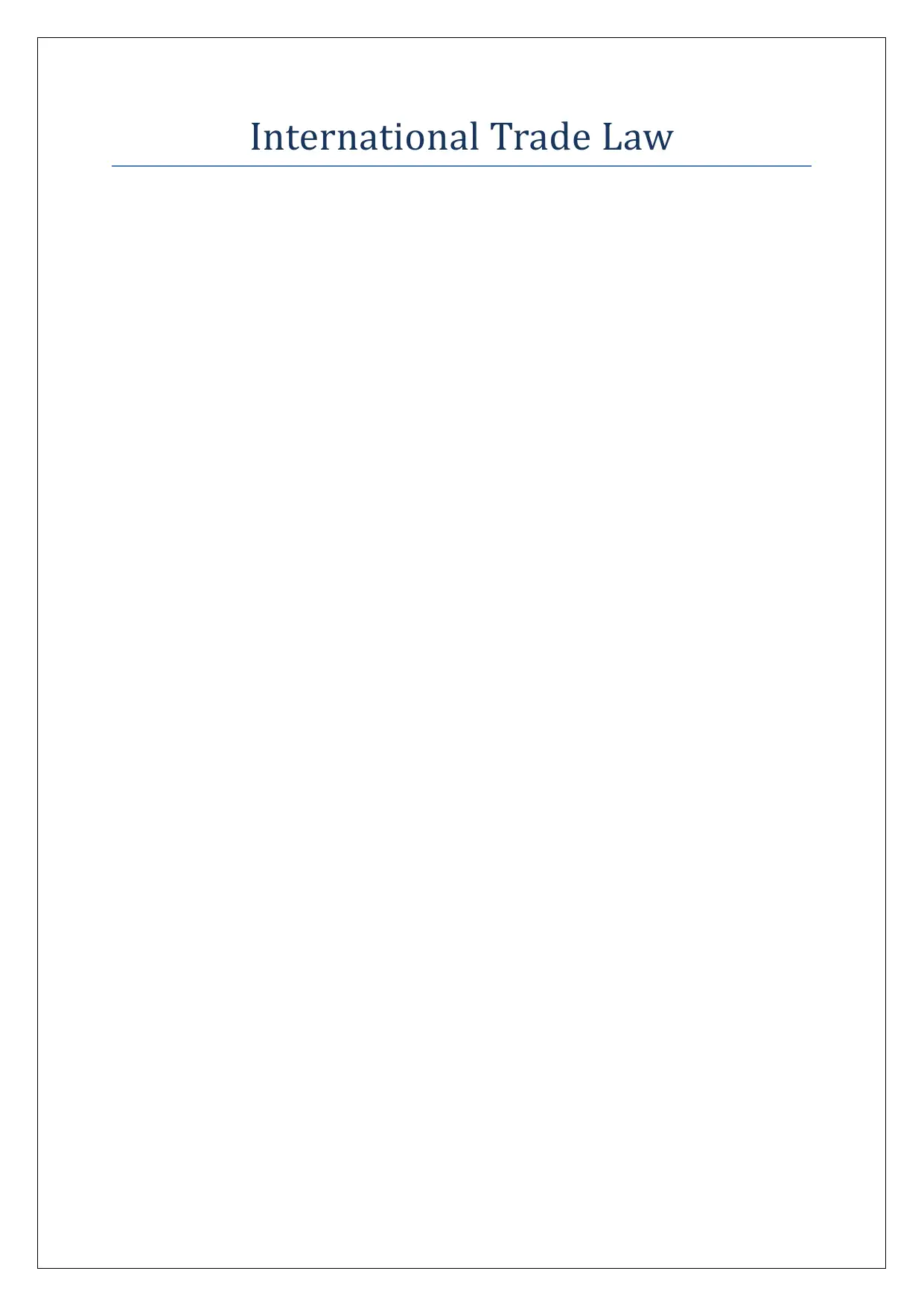
International Trade Law
Secure Best Marks with AI Grader
Need help grading? Try our AI Grader for instant feedback on your assignments.
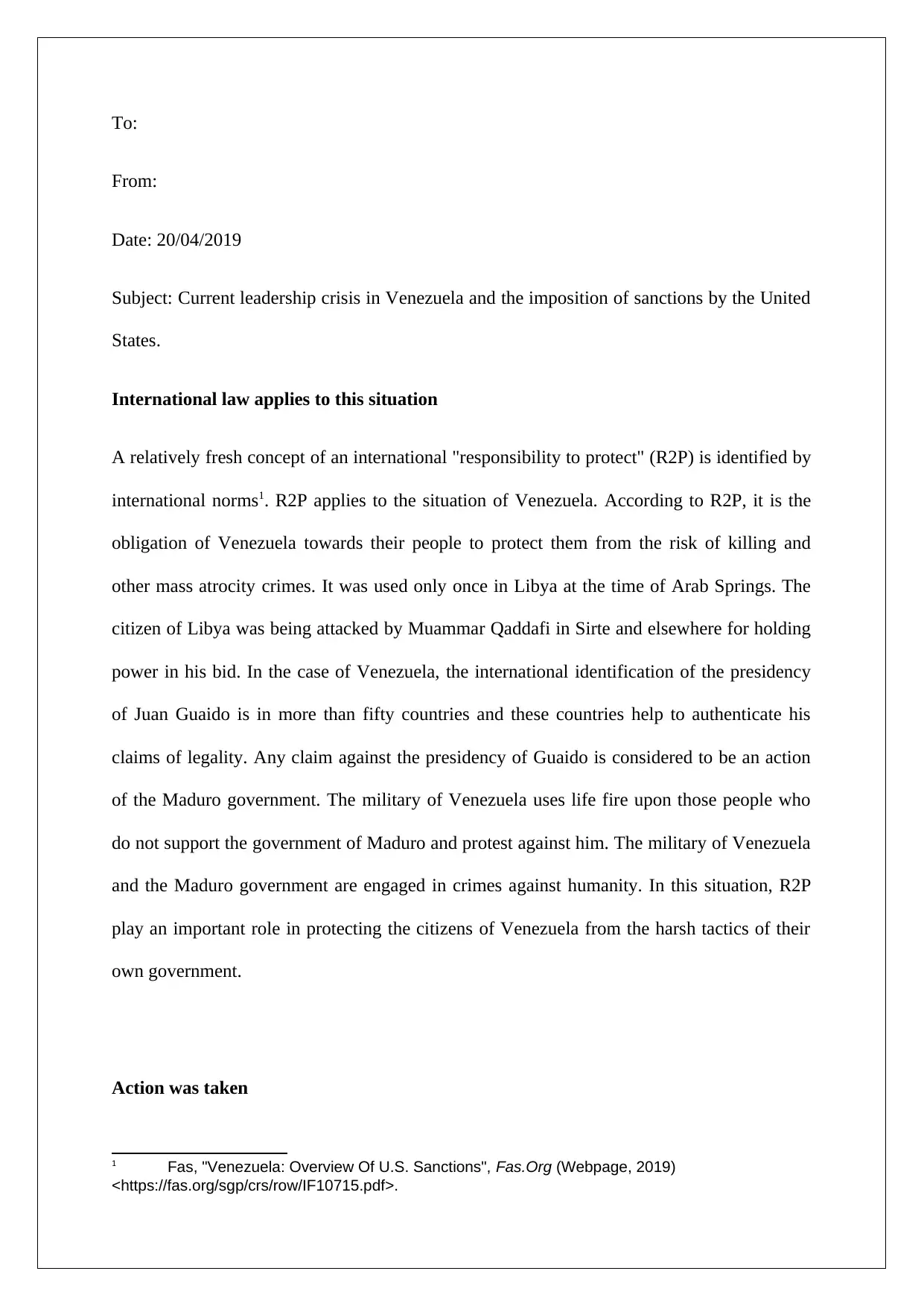
To:
From:
Date: 20/04/2019
Subject: Current leadership crisis in Venezuela and the imposition of sanctions by the United
States.
International law applies to this situation
A relatively fresh concept of an international "responsibility to protect" (R2P) is identified by
international norms1. R2P applies to the situation of Venezuela. According to R2P, it is the
obligation of Venezuela towards their people to protect them from the risk of killing and
other mass atrocity crimes. It was used only once in Libya at the time of Arab Springs. The
citizen of Libya was being attacked by Muammar Qaddafi in Sirte and elsewhere for holding
power in his bid. In the case of Venezuela, the international identification of the presidency
of Juan Guaido is in more than fifty countries and these countries help to authenticate his
claims of legality. Any claim against the presidency of Guaido is considered to be an action
of the Maduro government. The military of Venezuela uses life fire upon those people who
do not support the government of Maduro and protest against him. The military of Venezuela
and the Maduro government are engaged in crimes against humanity. In this situation, R2P
play an important role in protecting the citizens of Venezuela from the harsh tactics of their
own government.
Action was taken
1 Fas, "Venezuela: Overview Of U.S. Sanctions", Fas.Org (Webpage, 2019)
<https://fas.org/sgp/crs/row/IF10715.pdf>.
From:
Date: 20/04/2019
Subject: Current leadership crisis in Venezuela and the imposition of sanctions by the United
States.
International law applies to this situation
A relatively fresh concept of an international "responsibility to protect" (R2P) is identified by
international norms1. R2P applies to the situation of Venezuela. According to R2P, it is the
obligation of Venezuela towards their people to protect them from the risk of killing and
other mass atrocity crimes. It was used only once in Libya at the time of Arab Springs. The
citizen of Libya was being attacked by Muammar Qaddafi in Sirte and elsewhere for holding
power in his bid. In the case of Venezuela, the international identification of the presidency
of Juan Guaido is in more than fifty countries and these countries help to authenticate his
claims of legality. Any claim against the presidency of Guaido is considered to be an action
of the Maduro government. The military of Venezuela uses life fire upon those people who
do not support the government of Maduro and protest against him. The military of Venezuela
and the Maduro government are engaged in crimes against humanity. In this situation, R2P
play an important role in protecting the citizens of Venezuela from the harsh tactics of their
own government.
Action was taken
1 Fas, "Venezuela: Overview Of U.S. Sanctions", Fas.Org (Webpage, 2019)
<https://fas.org/sgp/crs/row/IF10715.pdf>.
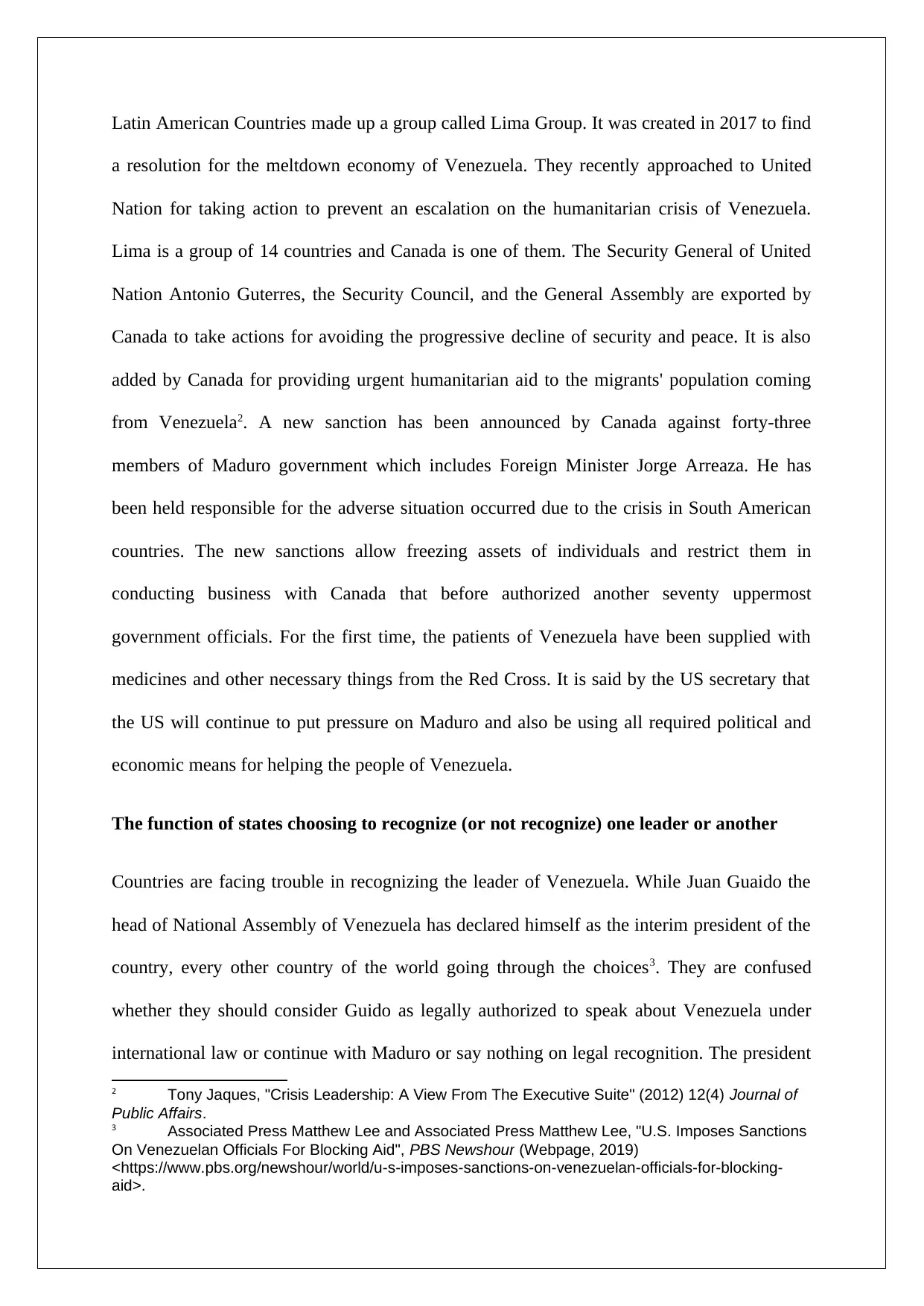
Latin American Countries made up a group called Lima Group. It was created in 2017 to find
a resolution for the meltdown economy of Venezuela. They recently approached to United
Nation for taking action to prevent an escalation on the humanitarian crisis of Venezuela.
Lima is a group of 14 countries and Canada is one of them. The Security General of United
Nation Antonio Guterres, the Security Council, and the General Assembly are exported by
Canada to take actions for avoiding the progressive decline of security and peace. It is also
added by Canada for providing urgent humanitarian aid to the migrants' population coming
from Venezuela2. A new sanction has been announced by Canada against forty-three
members of Maduro government which includes Foreign Minister Jorge Arreaza. He has
been held responsible for the adverse situation occurred due to the crisis in South American
countries. The new sanctions allow freezing assets of individuals and restrict them in
conducting business with Canada that before authorized another seventy uppermost
government officials. For the first time, the patients of Venezuela have been supplied with
medicines and other necessary things from the Red Cross. It is said by the US secretary that
the US will continue to put pressure on Maduro and also be using all required political and
economic means for helping the people of Venezuela.
The function of states choosing to recognize (or not recognize) one leader or another
Countries are facing trouble in recognizing the leader of Venezuela. While Juan Guaido the
head of National Assembly of Venezuela has declared himself as the interim president of the
country, every other country of the world going through the choices3. They are confused
whether they should consider Guido as legally authorized to speak about Venezuela under
international law or continue with Maduro or say nothing on legal recognition. The president
2 Tony Jaques, "Crisis Leadership: A View From The Executive Suite" (2012) 12(4) Journal of
Public Affairs.
3 Associated Press Matthew Lee and Associated Press Matthew Lee, "U.S. Imposes Sanctions
On Venezuelan Officials For Blocking Aid", PBS Newshour (Webpage, 2019)
<https://www.pbs.org/newshour/world/u-s-imposes-sanctions-on-venezuelan-officials-for-blocking-
aid>.
a resolution for the meltdown economy of Venezuela. They recently approached to United
Nation for taking action to prevent an escalation on the humanitarian crisis of Venezuela.
Lima is a group of 14 countries and Canada is one of them. The Security General of United
Nation Antonio Guterres, the Security Council, and the General Assembly are exported by
Canada to take actions for avoiding the progressive decline of security and peace. It is also
added by Canada for providing urgent humanitarian aid to the migrants' population coming
from Venezuela2. A new sanction has been announced by Canada against forty-three
members of Maduro government which includes Foreign Minister Jorge Arreaza. He has
been held responsible for the adverse situation occurred due to the crisis in South American
countries. The new sanctions allow freezing assets of individuals and restrict them in
conducting business with Canada that before authorized another seventy uppermost
government officials. For the first time, the patients of Venezuela have been supplied with
medicines and other necessary things from the Red Cross. It is said by the US secretary that
the US will continue to put pressure on Maduro and also be using all required political and
economic means for helping the people of Venezuela.
The function of states choosing to recognize (or not recognize) one leader or another
Countries are facing trouble in recognizing the leader of Venezuela. While Juan Guaido the
head of National Assembly of Venezuela has declared himself as the interim president of the
country, every other country of the world going through the choices3. They are confused
whether they should consider Guido as legally authorized to speak about Venezuela under
international law or continue with Maduro or say nothing on legal recognition. The president
2 Tony Jaques, "Crisis Leadership: A View From The Executive Suite" (2012) 12(4) Journal of
Public Affairs.
3 Associated Press Matthew Lee and Associated Press Matthew Lee, "U.S. Imposes Sanctions
On Venezuelan Officials For Blocking Aid", PBS Newshour (Webpage, 2019)
<https://www.pbs.org/newshour/world/u-s-imposes-sanctions-on-venezuelan-officials-for-blocking-
aid>.
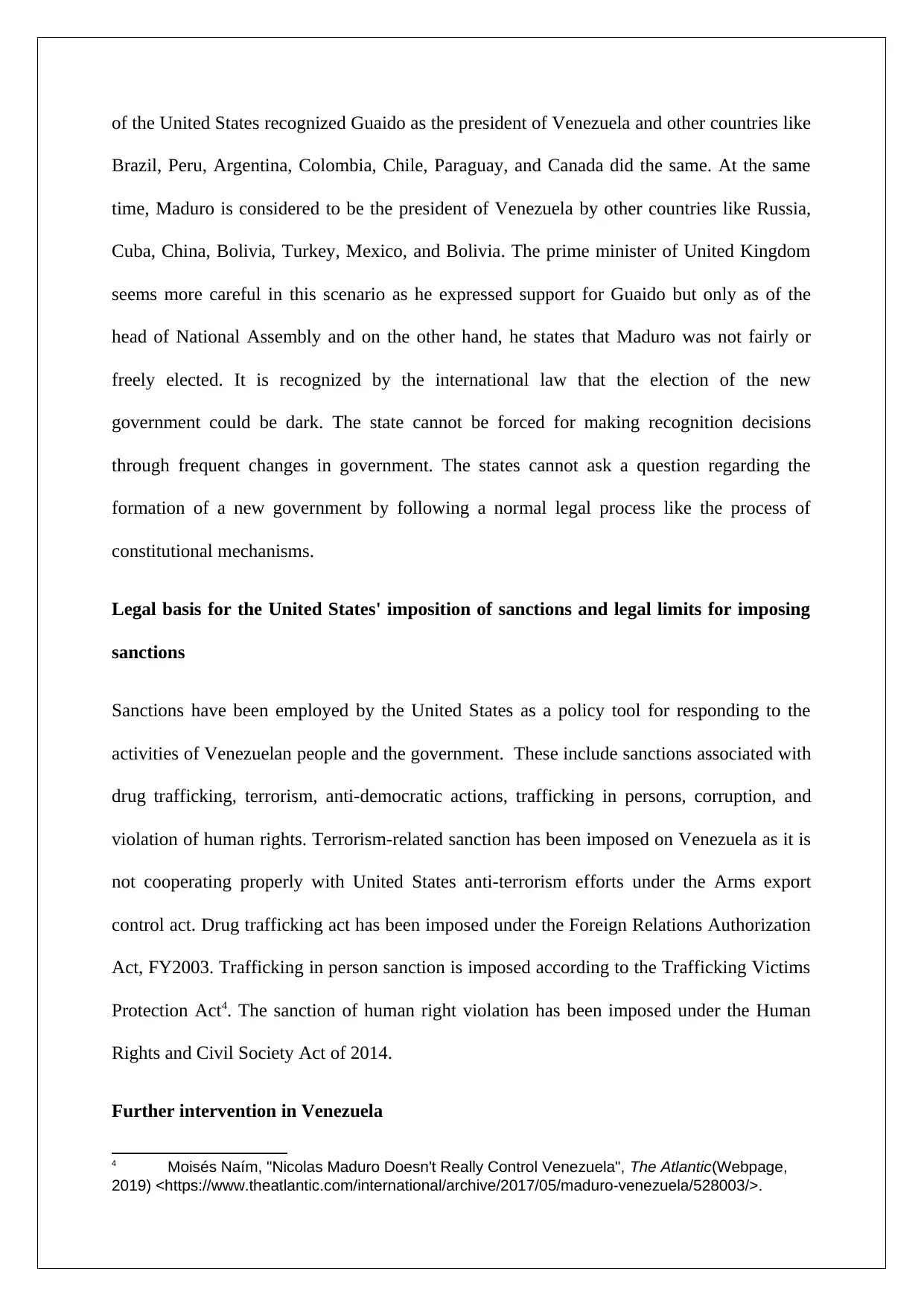
of the United States recognized Guaido as the president of Venezuela and other countries like
Brazil, Peru, Argentina, Colombia, Chile, Paraguay, and Canada did the same. At the same
time, Maduro is considered to be the president of Venezuela by other countries like Russia,
Cuba, China, Bolivia, Turkey, Mexico, and Bolivia. The prime minister of United Kingdom
seems more careful in this scenario as he expressed support for Guaido but only as of the
head of National Assembly and on the other hand, he states that Maduro was not fairly or
freely elected. It is recognized by the international law that the election of the new
government could be dark. The state cannot be forced for making recognition decisions
through frequent changes in government. The states cannot ask a question regarding the
formation of a new government by following a normal legal process like the process of
constitutional mechanisms.
Legal basis for the United States' imposition of sanctions and legal limits for imposing
sanctions
Sanctions have been employed by the United States as a policy tool for responding to the
activities of Venezuelan people and the government. These include sanctions associated with
drug trafficking, terrorism, anti-democratic actions, trafficking in persons, corruption, and
violation of human rights. Terrorism-related sanction has been imposed on Venezuela as it is
not cooperating properly with United States anti-terrorism efforts under the Arms export
control act. Drug trafficking act has been imposed under the Foreign Relations Authorization
Act, FY2003. Trafficking in person sanction is imposed according to the Trafficking Victims
Protection Act4. The sanction of human right violation has been imposed under the Human
Rights and Civil Society Act of 2014.
Further intervention in Venezuela
4 Moisés Naím, "Nicolas Maduro Doesn't Really Control Venezuela", The Atlantic(Webpage,
2019) <https://www.theatlantic.com/international/archive/2017/05/maduro-venezuela/528003/>.
Brazil, Peru, Argentina, Colombia, Chile, Paraguay, and Canada did the same. At the same
time, Maduro is considered to be the president of Venezuela by other countries like Russia,
Cuba, China, Bolivia, Turkey, Mexico, and Bolivia. The prime minister of United Kingdom
seems more careful in this scenario as he expressed support for Guaido but only as of the
head of National Assembly and on the other hand, he states that Maduro was not fairly or
freely elected. It is recognized by the international law that the election of the new
government could be dark. The state cannot be forced for making recognition decisions
through frequent changes in government. The states cannot ask a question regarding the
formation of a new government by following a normal legal process like the process of
constitutional mechanisms.
Legal basis for the United States' imposition of sanctions and legal limits for imposing
sanctions
Sanctions have been employed by the United States as a policy tool for responding to the
activities of Venezuelan people and the government. These include sanctions associated with
drug trafficking, terrorism, anti-democratic actions, trafficking in persons, corruption, and
violation of human rights. Terrorism-related sanction has been imposed on Venezuela as it is
not cooperating properly with United States anti-terrorism efforts under the Arms export
control act. Drug trafficking act has been imposed under the Foreign Relations Authorization
Act, FY2003. Trafficking in person sanction is imposed according to the Trafficking Victims
Protection Act4. The sanction of human right violation has been imposed under the Human
Rights and Civil Society Act of 2014.
Further intervention in Venezuela
4 Moisés Naím, "Nicolas Maduro Doesn't Really Control Venezuela", The Atlantic(Webpage,
2019) <https://www.theatlantic.com/international/archive/2017/05/maduro-venezuela/528003/>.
Secure Best Marks with AI Grader
Need help grading? Try our AI Grader for instant feedback on your assignments.
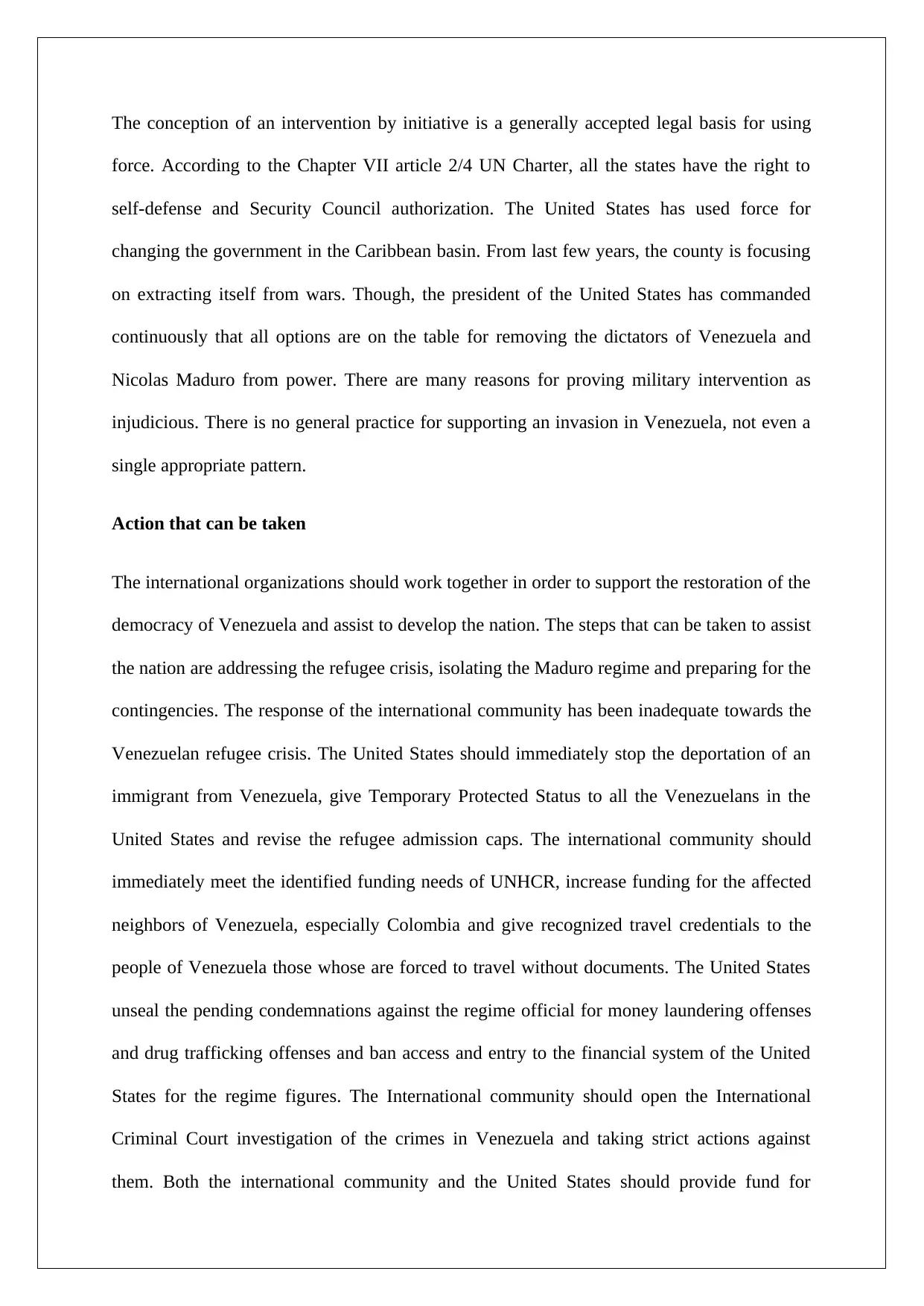
The conception of an intervention by initiative is a generally accepted legal basis for using
force. According to the Chapter VII article 2/4 UN Charter, all the states have the right to
self-defense and Security Council authorization. The United States has used force for
changing the government in the Caribbean basin. From last few years, the county is focusing
on extracting itself from wars. Though, the president of the United States has commanded
continuously that all options are on the table for removing the dictators of Venezuela and
Nicolas Maduro from power. There are many reasons for proving military intervention as
injudicious. There is no general practice for supporting an invasion in Venezuela, not even a
single appropriate pattern.
Action that can be taken
The international organizations should work together in order to support the restoration of the
democracy of Venezuela and assist to develop the nation. The steps that can be taken to assist
the nation are addressing the refugee crisis, isolating the Maduro regime and preparing for the
contingencies. The response of the international community has been inadequate towards the
Venezuelan refugee crisis. The United States should immediately stop the deportation of an
immigrant from Venezuela, give Temporary Protected Status to all the Venezuelans in the
United States and revise the refugee admission caps. The international community should
immediately meet the identified funding needs of UNHCR, increase funding for the affected
neighbors of Venezuela, especially Colombia and give recognized travel credentials to the
people of Venezuela those whose are forced to travel without documents. The United States
unseal the pending condemnations against the regime official for money laundering offenses
and drug trafficking offenses and ban access and entry to the financial system of the United
States for the regime figures. The International community should open the International
Criminal Court investigation of the crimes in Venezuela and taking strict actions against
them. Both the international community and the United States should provide fund for
force. According to the Chapter VII article 2/4 UN Charter, all the states have the right to
self-defense and Security Council authorization. The United States has used force for
changing the government in the Caribbean basin. From last few years, the county is focusing
on extracting itself from wars. Though, the president of the United States has commanded
continuously that all options are on the table for removing the dictators of Venezuela and
Nicolas Maduro from power. There are many reasons for proving military intervention as
injudicious. There is no general practice for supporting an invasion in Venezuela, not even a
single appropriate pattern.
Action that can be taken
The international organizations should work together in order to support the restoration of the
democracy of Venezuela and assist to develop the nation. The steps that can be taken to assist
the nation are addressing the refugee crisis, isolating the Maduro regime and preparing for the
contingencies. The response of the international community has been inadequate towards the
Venezuelan refugee crisis. The United States should immediately stop the deportation of an
immigrant from Venezuela, give Temporary Protected Status to all the Venezuelans in the
United States and revise the refugee admission caps. The international community should
immediately meet the identified funding needs of UNHCR, increase funding for the affected
neighbors of Venezuela, especially Colombia and give recognized travel credentials to the
people of Venezuela those whose are forced to travel without documents. The United States
unseal the pending condemnations against the regime official for money laundering offenses
and drug trafficking offenses and ban access and entry to the financial system of the United
States for the regime figures. The International community should open the International
Criminal Court investigation of the crimes in Venezuela and taking strict actions against
them. Both the international community and the United States should provide fund for
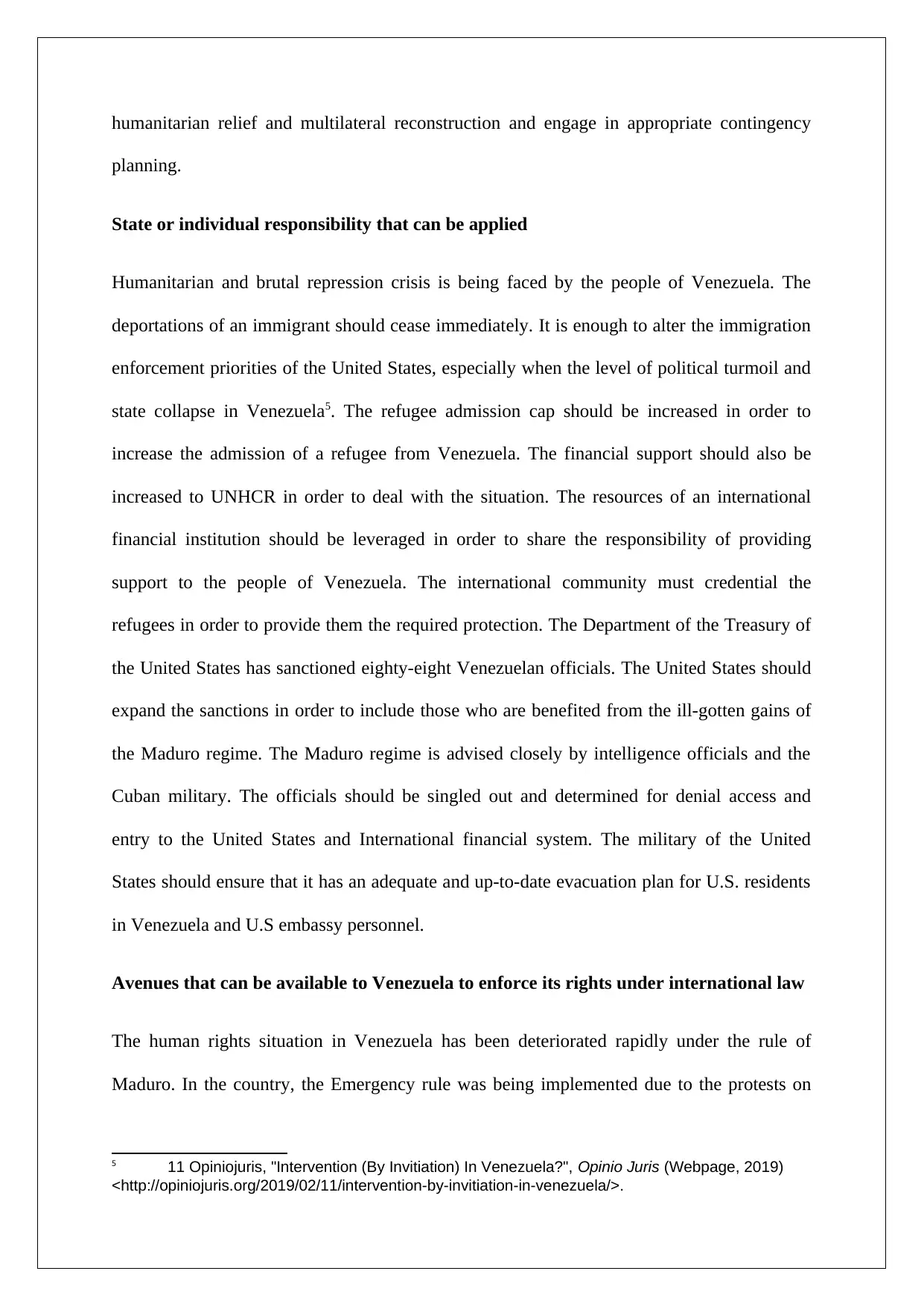
humanitarian relief and multilateral reconstruction and engage in appropriate contingency
planning.
State or individual responsibility that can be applied
Humanitarian and brutal repression crisis is being faced by the people of Venezuela. The
deportations of an immigrant should cease immediately. It is enough to alter the immigration
enforcement priorities of the United States, especially when the level of political turmoil and
state collapse in Venezuela5. The refugee admission cap should be increased in order to
increase the admission of a refugee from Venezuela. The financial support should also be
increased to UNHCR in order to deal with the situation. The resources of an international
financial institution should be leveraged in order to share the responsibility of providing
support to the people of Venezuela. The international community must credential the
refugees in order to provide them the required protection. The Department of the Treasury of
the United States has sanctioned eighty-eight Venezuelan officials. The United States should
expand the sanctions in order to include those who are benefited from the ill-gotten gains of
the Maduro regime. The Maduro regime is advised closely by intelligence officials and the
Cuban military. The officials should be singled out and determined for denial access and
entry to the United States and International financial system. The military of the United
States should ensure that it has an adequate and up-to-date evacuation plan for U.S. residents
in Venezuela and U.S embassy personnel.
Avenues that can be available to Venezuela to enforce its rights under international law
The human rights situation in Venezuela has been deteriorated rapidly under the rule of
Maduro. In the country, the Emergency rule was being implemented due to the protests on
5 11 Opiniojuris, "Intervention (By Invitiation) In Venezuela?", Opinio Juris (Webpage, 2019)
<http://opiniojuris.org/2019/02/11/intervention-by-invitiation-in-venezuela/>.
planning.
State or individual responsibility that can be applied
Humanitarian and brutal repression crisis is being faced by the people of Venezuela. The
deportations of an immigrant should cease immediately. It is enough to alter the immigration
enforcement priorities of the United States, especially when the level of political turmoil and
state collapse in Venezuela5. The refugee admission cap should be increased in order to
increase the admission of a refugee from Venezuela. The financial support should also be
increased to UNHCR in order to deal with the situation. The resources of an international
financial institution should be leveraged in order to share the responsibility of providing
support to the people of Venezuela. The international community must credential the
refugees in order to provide them the required protection. The Department of the Treasury of
the United States has sanctioned eighty-eight Venezuelan officials. The United States should
expand the sanctions in order to include those who are benefited from the ill-gotten gains of
the Maduro regime. The Maduro regime is advised closely by intelligence officials and the
Cuban military. The officials should be singled out and determined for denial access and
entry to the United States and International financial system. The military of the United
States should ensure that it has an adequate and up-to-date evacuation plan for U.S. residents
in Venezuela and U.S embassy personnel.
Avenues that can be available to Venezuela to enforce its rights under international law
The human rights situation in Venezuela has been deteriorated rapidly under the rule of
Maduro. In the country, the Emergency rule was being implemented due to the protests on
5 11 Opiniojuris, "Intervention (By Invitiation) In Venezuela?", Opinio Juris (Webpage, 2019)
<http://opiniojuris.org/2019/02/11/intervention-by-invitiation-in-venezuela/>.
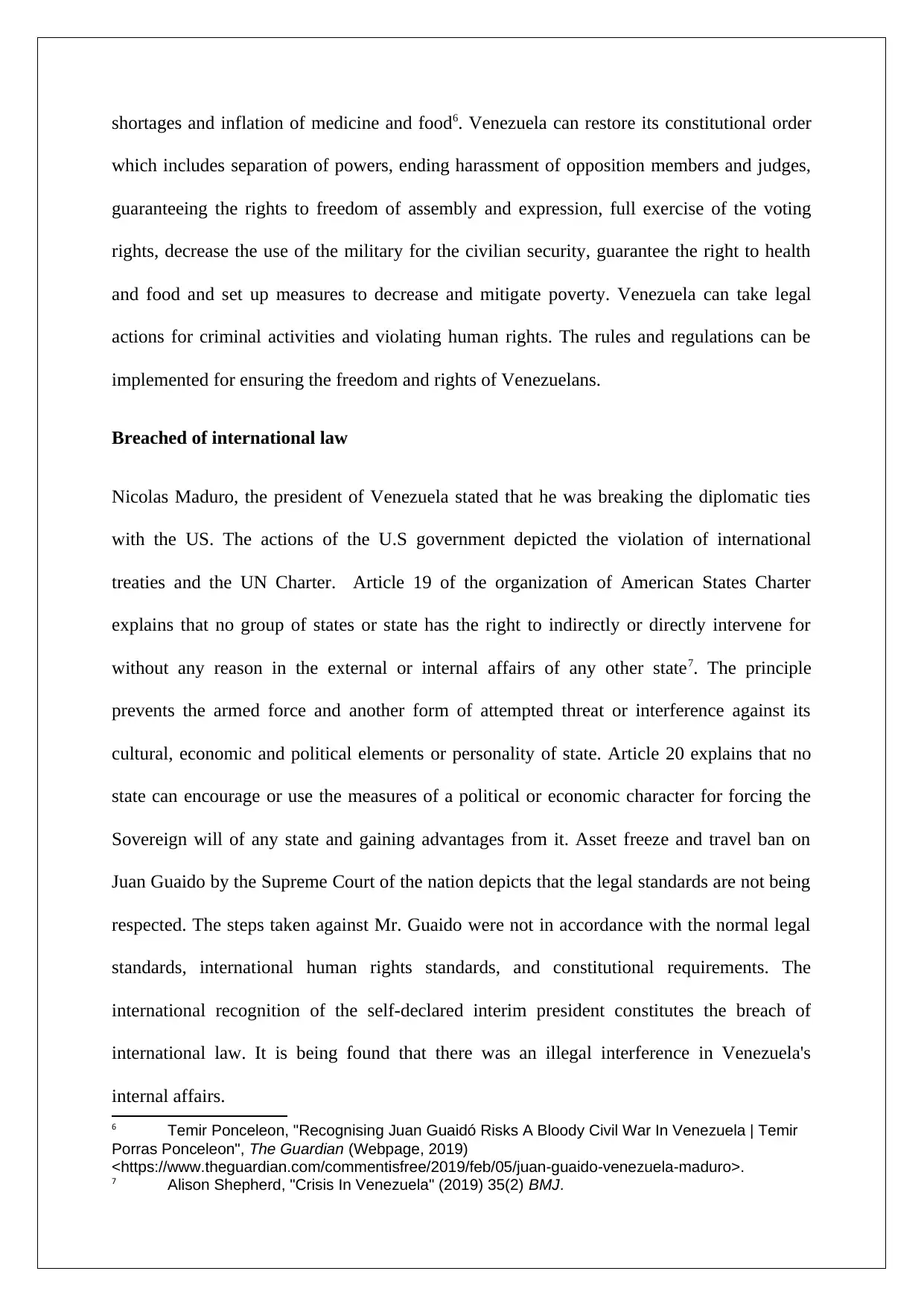
shortages and inflation of medicine and food6. Venezuela can restore its constitutional order
which includes separation of powers, ending harassment of opposition members and judges,
guaranteeing the rights to freedom of assembly and expression, full exercise of the voting
rights, decrease the use of the military for the civilian security, guarantee the right to health
and food and set up measures to decrease and mitigate poverty. Venezuela can take legal
actions for criminal activities and violating human rights. The rules and regulations can be
implemented for ensuring the freedom and rights of Venezuelans.
Breached of international law
Nicolas Maduro, the president of Venezuela stated that he was breaking the diplomatic ties
with the US. The actions of the U.S government depicted the violation of international
treaties and the UN Charter. Article 19 of the organization of American States Charter
explains that no group of states or state has the right to indirectly or directly intervene for
without any reason in the external or internal affairs of any other state7. The principle
prevents the armed force and another form of attempted threat or interference against its
cultural, economic and political elements or personality of state. Article 20 explains that no
state can encourage or use the measures of a political or economic character for forcing the
Sovereign will of any state and gaining advantages from it. Asset freeze and travel ban on
Juan Guaido by the Supreme Court of the nation depicts that the legal standards are not being
respected. The steps taken against Mr. Guaido were not in accordance with the normal legal
standards, international human rights standards, and constitutional requirements. The
international recognition of the self-declared interim president constitutes the breach of
international law. It is being found that there was an illegal interference in Venezuela's
internal affairs.
6 Temir Ponceleon, "Recognising Juan Guaidó Risks A Bloody Civil War In Venezuela | Temir
Porras Ponceleon", The Guardian (Webpage, 2019)
<https://www.theguardian.com/commentisfree/2019/feb/05/juan-guaido-venezuela-maduro>.
7 Alison Shepherd, "Crisis In Venezuela" (2019) 35(2) BMJ.
which includes separation of powers, ending harassment of opposition members and judges,
guaranteeing the rights to freedom of assembly and expression, full exercise of the voting
rights, decrease the use of the military for the civilian security, guarantee the right to health
and food and set up measures to decrease and mitigate poverty. Venezuela can take legal
actions for criminal activities and violating human rights. The rules and regulations can be
implemented for ensuring the freedom and rights of Venezuelans.
Breached of international law
Nicolas Maduro, the president of Venezuela stated that he was breaking the diplomatic ties
with the US. The actions of the U.S government depicted the violation of international
treaties and the UN Charter. Article 19 of the organization of American States Charter
explains that no group of states or state has the right to indirectly or directly intervene for
without any reason in the external or internal affairs of any other state7. The principle
prevents the armed force and another form of attempted threat or interference against its
cultural, economic and political elements or personality of state. Article 20 explains that no
state can encourage or use the measures of a political or economic character for forcing the
Sovereign will of any state and gaining advantages from it. Asset freeze and travel ban on
Juan Guaido by the Supreme Court of the nation depicts that the legal standards are not being
respected. The steps taken against Mr. Guaido were not in accordance with the normal legal
standards, international human rights standards, and constitutional requirements. The
international recognition of the self-declared interim president constitutes the breach of
international law. It is being found that there was an illegal interference in Venezuela's
internal affairs.
6 Temir Ponceleon, "Recognising Juan Guaidó Risks A Bloody Civil War In Venezuela | Temir
Porras Ponceleon", The Guardian (Webpage, 2019)
<https://www.theguardian.com/commentisfree/2019/feb/05/juan-guaido-venezuela-maduro>.
7 Alison Shepherd, "Crisis In Venezuela" (2019) 35(2) BMJ.
Paraphrase This Document
Need a fresh take? Get an instant paraphrase of this document with our AI Paraphraser
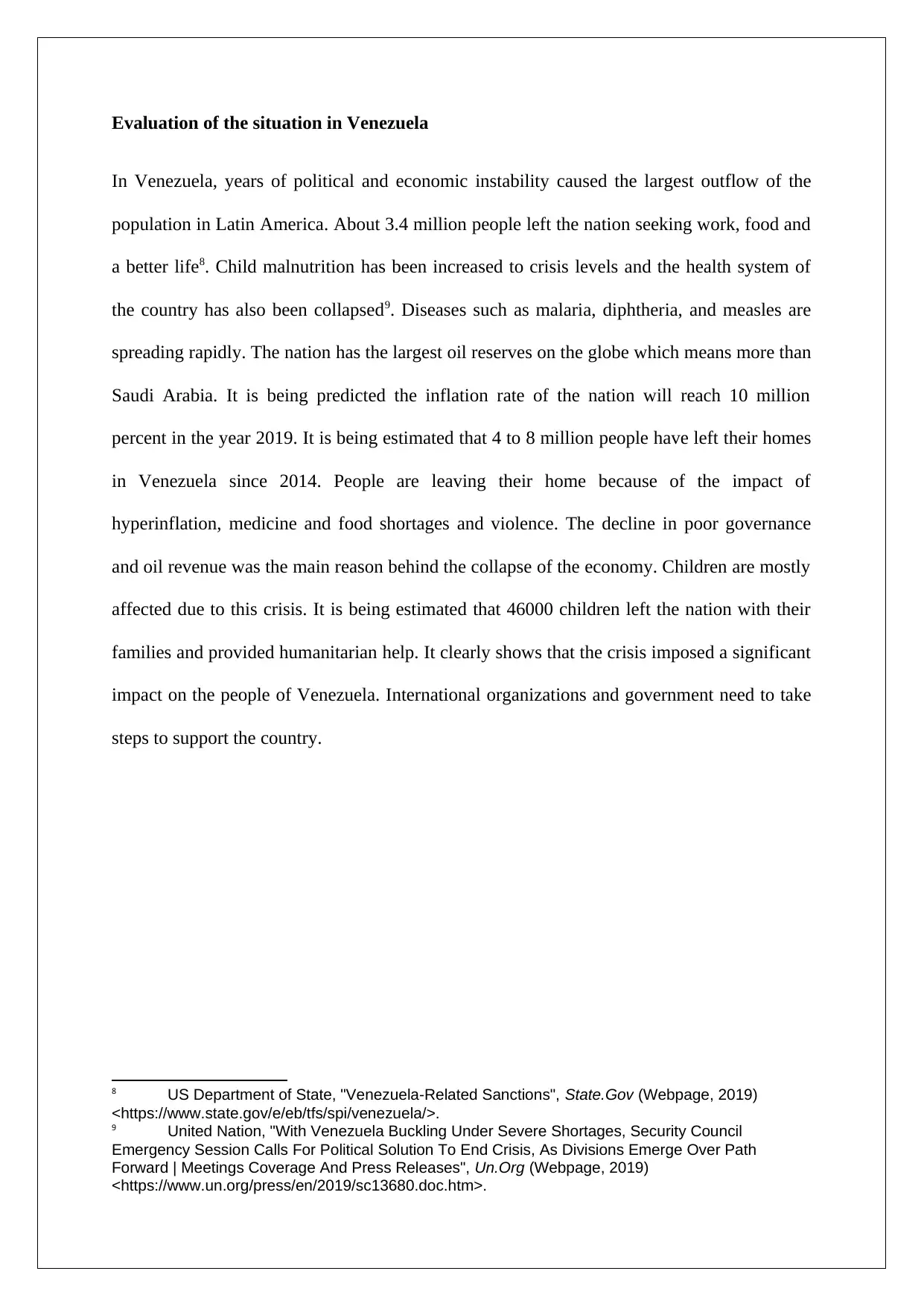
Evaluation of the situation in Venezuela
In Venezuela, years of political and economic instability caused the largest outflow of the
population in Latin America. About 3.4 million people left the nation seeking work, food and
a better life8. Child malnutrition has been increased to crisis levels and the health system of
the country has also been collapsed9. Diseases such as malaria, diphtheria, and measles are
spreading rapidly. The nation has the largest oil reserves on the globe which means more than
Saudi Arabia. It is being predicted the inflation rate of the nation will reach 10 million
percent in the year 2019. It is being estimated that 4 to 8 million people have left their homes
in Venezuela since 2014. People are leaving their home because of the impact of
hyperinflation, medicine and food shortages and violence. The decline in poor governance
and oil revenue was the main reason behind the collapse of the economy. Children are mostly
affected due to this crisis. It is being estimated that 46000 children left the nation with their
families and provided humanitarian help. It clearly shows that the crisis imposed a significant
impact on the people of Venezuela. International organizations and government need to take
steps to support the country.
8 US Department of State, "Venezuela-Related Sanctions", State.Gov (Webpage, 2019)
<https://www.state.gov/e/eb/tfs/spi/venezuela/>.
9 United Nation, "With Venezuela Buckling Under Severe Shortages, Security Council
Emergency Session Calls For Political Solution To End Crisis, As Divisions Emerge Over Path
Forward | Meetings Coverage And Press Releases", Un.Org (Webpage, 2019)
<https://www.un.org/press/en/2019/sc13680.doc.htm>.
In Venezuela, years of political and economic instability caused the largest outflow of the
population in Latin America. About 3.4 million people left the nation seeking work, food and
a better life8. Child malnutrition has been increased to crisis levels and the health system of
the country has also been collapsed9. Diseases such as malaria, diphtheria, and measles are
spreading rapidly. The nation has the largest oil reserves on the globe which means more than
Saudi Arabia. It is being predicted the inflation rate of the nation will reach 10 million
percent in the year 2019. It is being estimated that 4 to 8 million people have left their homes
in Venezuela since 2014. People are leaving their home because of the impact of
hyperinflation, medicine and food shortages and violence. The decline in poor governance
and oil revenue was the main reason behind the collapse of the economy. Children are mostly
affected due to this crisis. It is being estimated that 46000 children left the nation with their
families and provided humanitarian help. It clearly shows that the crisis imposed a significant
impact on the people of Venezuela. International organizations and government need to take
steps to support the country.
8 US Department of State, "Venezuela-Related Sanctions", State.Gov (Webpage, 2019)
<https://www.state.gov/e/eb/tfs/spi/venezuela/>.
9 United Nation, "With Venezuela Buckling Under Severe Shortages, Security Council
Emergency Session Calls For Political Solution To End Crisis, As Divisions Emerge Over Path
Forward | Meetings Coverage And Press Releases", Un.Org (Webpage, 2019)
<https://www.un.org/press/en/2019/sc13680.doc.htm>.
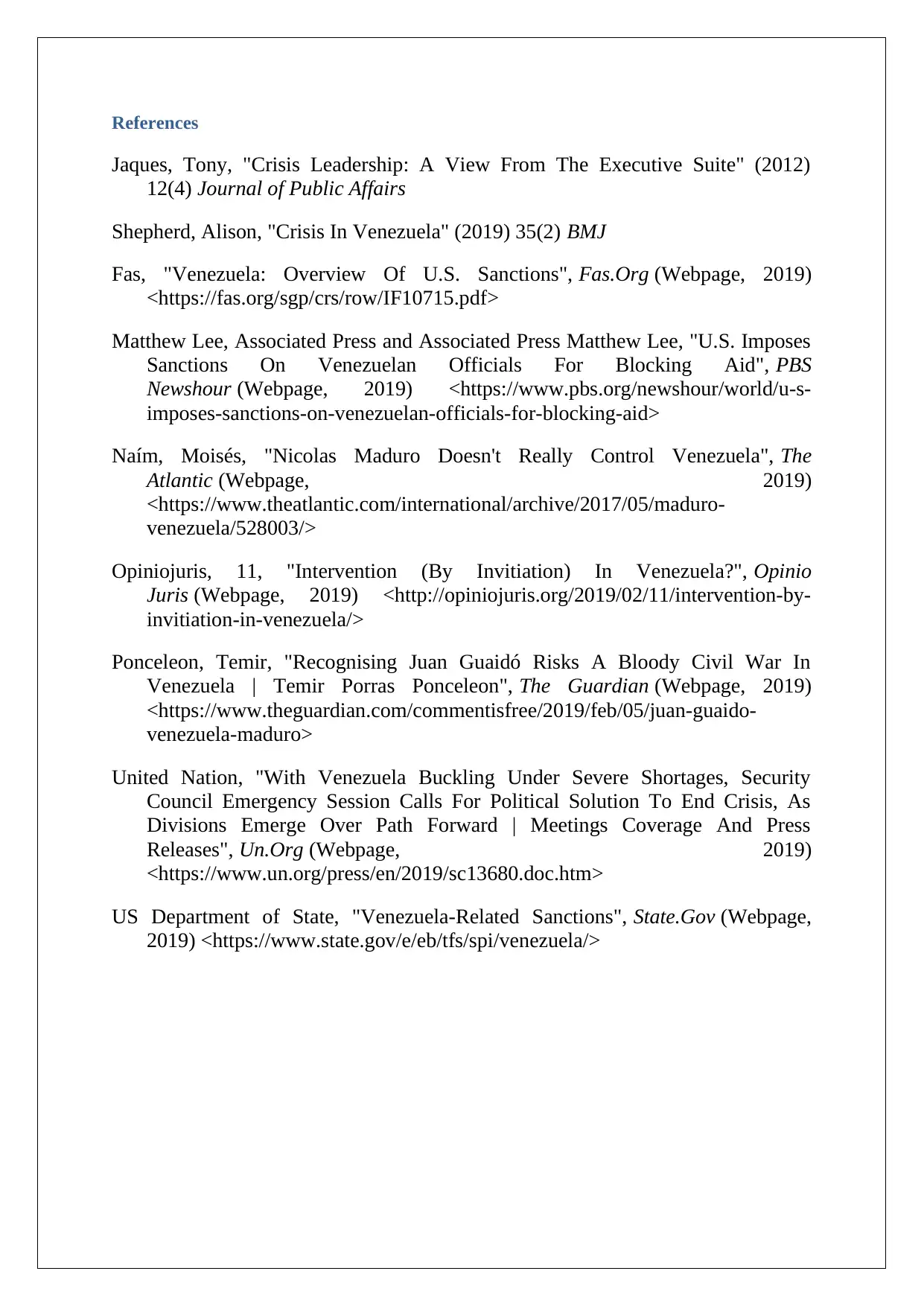
References
Jaques, Tony, "Crisis Leadership: A View From The Executive Suite" (2012)
12(4) Journal of Public Affairs
Shepherd, Alison, "Crisis In Venezuela" (2019) 35(2) BMJ
Fas, "Venezuela: Overview Of U.S. Sanctions", Fas.Org (Webpage, 2019)
<https://fas.org/sgp/crs/row/IF10715.pdf>
Matthew Lee, Associated Press and Associated Press Matthew Lee, "U.S. Imposes
Sanctions On Venezuelan Officials For Blocking Aid", PBS
Newshour (Webpage, 2019) <https://www.pbs.org/newshour/world/u-s-
imposes-sanctions-on-venezuelan-officials-for-blocking-aid>
Naím, Moisés, "Nicolas Maduro Doesn't Really Control Venezuela", The
Atlantic (Webpage, 2019)
<https://www.theatlantic.com/international/archive/2017/05/maduro-
venezuela/528003/>
Opiniojuris, 11, "Intervention (By Invitiation) In Venezuela?", Opinio
Juris (Webpage, 2019) <http://opiniojuris.org/2019/02/11/intervention-by-
invitiation-in-venezuela/>
Ponceleon, Temir, "Recognising Juan Guaidó Risks A Bloody Civil War In
Venezuela | Temir Porras Ponceleon", The Guardian (Webpage, 2019)
<https://www.theguardian.com/commentisfree/2019/feb/05/juan-guaido-
venezuela-maduro>
United Nation, "With Venezuela Buckling Under Severe Shortages, Security
Council Emergency Session Calls For Political Solution To End Crisis, As
Divisions Emerge Over Path Forward | Meetings Coverage And Press
Releases", Un.Org (Webpage, 2019)
<https://www.un.org/press/en/2019/sc13680.doc.htm>
US Department of State, "Venezuela-Related Sanctions", State.Gov (Webpage,
2019) <https://www.state.gov/e/eb/tfs/spi/venezuela/>
Jaques, Tony, "Crisis Leadership: A View From The Executive Suite" (2012)
12(4) Journal of Public Affairs
Shepherd, Alison, "Crisis In Venezuela" (2019) 35(2) BMJ
Fas, "Venezuela: Overview Of U.S. Sanctions", Fas.Org (Webpage, 2019)
<https://fas.org/sgp/crs/row/IF10715.pdf>
Matthew Lee, Associated Press and Associated Press Matthew Lee, "U.S. Imposes
Sanctions On Venezuelan Officials For Blocking Aid", PBS
Newshour (Webpage, 2019) <https://www.pbs.org/newshour/world/u-s-
imposes-sanctions-on-venezuelan-officials-for-blocking-aid>
Naím, Moisés, "Nicolas Maduro Doesn't Really Control Venezuela", The
Atlantic (Webpage, 2019)
<https://www.theatlantic.com/international/archive/2017/05/maduro-
venezuela/528003/>
Opiniojuris, 11, "Intervention (By Invitiation) In Venezuela?", Opinio
Juris (Webpage, 2019) <http://opiniojuris.org/2019/02/11/intervention-by-
invitiation-in-venezuela/>
Ponceleon, Temir, "Recognising Juan Guaidó Risks A Bloody Civil War In
Venezuela | Temir Porras Ponceleon", The Guardian (Webpage, 2019)
<https://www.theguardian.com/commentisfree/2019/feb/05/juan-guaido-
venezuela-maduro>
United Nation, "With Venezuela Buckling Under Severe Shortages, Security
Council Emergency Session Calls For Political Solution To End Crisis, As
Divisions Emerge Over Path Forward | Meetings Coverage And Press
Releases", Un.Org (Webpage, 2019)
<https://www.un.org/press/en/2019/sc13680.doc.htm>
US Department of State, "Venezuela-Related Sanctions", State.Gov (Webpage,
2019) <https://www.state.gov/e/eb/tfs/spi/venezuela/>
1 out of 9
Related Documents
Your All-in-One AI-Powered Toolkit for Academic Success.
+13062052269
info@desklib.com
Available 24*7 on WhatsApp / Email
![[object Object]](/_next/static/media/star-bottom.7253800d.svg)
Unlock your academic potential
© 2024 | Zucol Services PVT LTD | All rights reserved.





